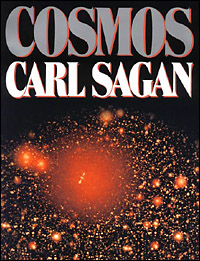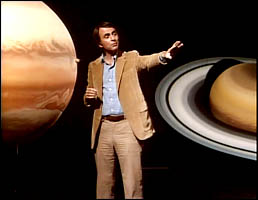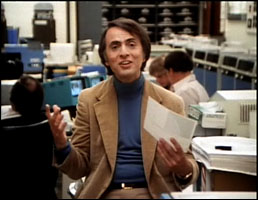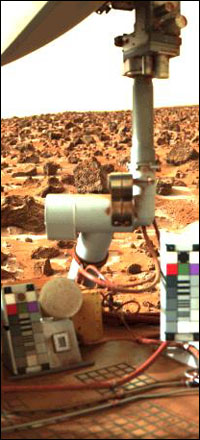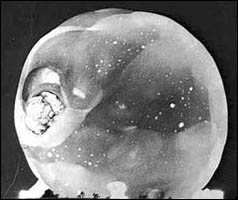
Cosmos appeared on PBS in 1980. I don't think I saw it then; the first memory I have of it is of catching the end of the fourth installment, and that memory is datestamped April 1981. It seems reasonable to infer that PBS affiliates reran it over and over for years. I know it reran yet again in 1982 or '83, because that time it was appointment television for me. I was in fifth grade that year, and my science teacher showed us a taped episode once a week. Ten years later the series was rerun with updates at the end, and the whole thing came out on VHS; the DVDs ten years after that, annoyingly, went an extra step and replaced some of the original footage with clips on entirely different film stock, replacing, for instance, the shots of 1979 mainframes with video of guys surfing the web on laptops. I have read that Cosmos was viewed, at least in part, by 3% of the population of the world at the time. But it would have played nowhere nearly as big a role in my life as it did had it not been for the companion book. I don't know why we had the hardcover version of Cosmos in our house when I was a kid. Maybe it was a gift for me, or maybe my dad had just bought it for himself — if I ever knew, I don't recall now. But in any case, I came to acquire it and read it until it fell apart. The copy I have now is a trade paperback I got in 1992. It's getting a little frayed, but aren't we all. Nowadays, I recognize that a glossy, oversized companion volume to a television series is a coffee-table book. Reading it at age 31, I found the prose as elegant as ever but the book as a whole nowhere nearly as erudite as I'd remembered. Such are the risks of forming one's impression of a book at age eight, I guess. As a kid I didn't realize that Cosmos was a popularization aimed squarely at the middlebrow masses. It sure seemed like hardcore science to me. Some of this impression, oddly, derived from the way the photo and art credits were incorporated right into the captions. "Life on Earth: A scanning electron micrograph of a mite, with hibiscus pollen. Courtesy Jean-Paul Revel, California Institute of Technology." None of the other books I read had captions that concluded with what seemed to me to be highly academic citations. Clearly I was reading above my station. And, in fact, I was — while on this latest reread I found many passages that I could recite from quarter-century-old memory, and every painting, photograph, drawing and map was an old friend, there were certain passages I hadn't processed before. Certainly when I was four feet tall I was skimming past the stuff about Christiaan Huygens and neutrino astronomy. That's actually another advantage of the book over the TV series — as a kid I could skip around and seize on the pages that sparked my interest. When the TV shows hit dull parts I just had to sit through them.
What effect did it have? As I reread the book and rewatched the shows, I jotted down the lessons that I learned from Cosmos as a kid: All fields of inquiry are interconnected. I went to high school fifteen miles away from my house because it had a magnet program in computer science... and yet when our class's hardware got handed out at the end of my senior year, my big award was in liberal arts. I went to UC Berkeley because I had no idea whether I'd be majoring in philosophy or physics or political science or what, and Cal had good programs in everything. A lot of the people reading this know me through my involvement with interactive fiction, a hobby which attracts people who are both right-brained enough to be interested in narrative and left-brained enough to want to involve computers in the process. I suspect that a lot of my interdisciplinary inclinations I owe to Cosmos. In my SAT classes I warn students that their essays are graded too hastily for them to be able to get away with holding their theses until the end. Sagan holds his until Part 12 of 13, "Encyclopaedia Galactica." From the beginning he's made it clear that his main theme is that humanity is beginning to venture out into space, and may someday make contact with an alien civilization. Now he presents the Drake Equation: to determine how many civilizations in this galaxy are as advanced or more advanced than we, multiply the number of stars in the galaxy by the fraction with planets, then by the number of planets per system on which life could arise, then by the fraction of such planets on which life does arise, then by the fraction of such life that develops intelligence, then by the fraction of such intelligent life that develops technology, then by the fraction of such technical civilizations that don't promptly destroy themselves. "The Drake Equation contains much of the Cosmos," Sagan notes. And, indeed, it explains the organizing principle of the book. The first two elements require a knowledge of astronomy: hence Part 1, an overview of some topics in astronomy; Part 9, on stars; and Part 10, on galaxies. The third deals with planetary astronomy in particular and, within that field, with the possibility of life on other worlds: hence Part 4, on Venus; Part 5, on Mars; and Part 6, on the outer solar system. Pondering the origin of life requires some familiarity with evolutionary biology, prompting Part 2, on that very topic. To discuss the development of intelligence we need to know something about the brain, which is covered in Part 11. Understanding how intelligent creatures develop a technological civilization requires at least a crash course on the history of science, provided in Parts 3 and 7; the feasibility of contacting others cannot be discussed without a brief grounding in the physics of relativity, which is Part 8. And finally, the big question of whether civilizations with advanced technology snuff themselves out as a matter of course: Part 13. So answering one question, I learned, required study of astronomy, geology, biology, chemistry, psychology, history, physics, and politics... not to mention math, to multiply the numbers once you had them. The development of the Dutch trading empire, I learned, sheds light on Voyager 1. The fate of Hypatia could teach us something about the potential causes of World War III. It works the other way around, too. Artificial and natural selection prove vital to understanding certain aspects of Japanese myth. Isaac Newton's laws, probably much to Newton's chagrin, help to quantify the idiocy of reading horoscopes. Moral: don't become a pure techie; don't become quantitatively inept. You need both halves to really understand anything.
So did Cosmos teach me that learning is cool? No. Quite the opposite. It taught me that a geek's life is richer than a cool kid's, that there's too much in the universe to greet it with a leather jacket and sunglasses and an ironic smirk. When Carl Sagan sat in his imaginary spaceship looking at a matte painting of a spiral galaxy or a crude animation of a pulsar, there was no "been there done that" — he was agog with wonderment. Watching new data about Jovian satellites arrive at JPL, there was nothing coolly blasé about him — he was practically bouncing off the walls.
Sagan didn't just introduce me to astronomy and biology and chemistry and history and the rest of the subjects I listed above — he introduced them exuberantly, made it clear that the pursuit of any one of them would be full of the giddiness of discovery, the thrill of suddenly seeing the framework connecting a bunch of different data points. It was quite a shock to get to college and learn how much drudgery was involved in the lives of scholars and scientists; Sagan had made the intellectual life seem like nonstop excitement. American culture teaches kids that education is something to be avoided or at best endured, and most of them have taken that lesson to heart. My experience working in public schools suggests that if kids put half as much effort into their work as they do angling for bathroom passes, US schools wouldn't lag those in the rest of the developed world. But, partly thanks to Cosmos, I learned the opposite lesson. Cut class? These days I fantasize about moving back to Berkeley and sneaking into lecture halls. Truth is more wondrous than fiction. I remember that when we watched Cosmos in fifth grade, some kids complained that Sagan kept explaining things without recourse to God — sometimes he even brought up God only to show that trying to fit such an entity into the process would be begging the question. In retrospect I can see that these kids were in a pretty tough position: at an age when the brain is geared to soak in whatever messages it receives, every Sunday they got one explanation of the universe and every Tuesday they got a very different one. The difference is that in Cosmos, Sagan repeated over and over that not a word he said should be taken on authority, that scientists throughout the ages had developed beautiful theories that turned out to be dead wrong, that every piece of scientific "truth" should continue to be tested and rejected if it didn't match empirical data. It'd take an awfully progressive Sunday school to say the same. I wasn't raised Christian, but my mother's adoptive parents were, and when I was very small I'd read some of the Christian children's books they'd kept from the 1940s. I'd also read the cut-rate ten-volume introduction to Islam my dad had ordered for me when I was five. So I was familiar with what Western monotheism had to say in the way of miracles. Sagan didn't have miracles to offer. Instead he had this.
One more thing: not only is this kind of stuff is much more awe-inspiring than magic tricks by an invisible man in the sky, it also has the advantage of being true. The reality-based community is the place to be. I say that Cosmos was the foundation stone of my brain. Tom DeLay says his mission in life is to propagate a "biblical worldview." As my worldview largely came from Cosmos, I suppose you could say that in that sense it is my Bible. But I didn't become a scientist. I imagine that this would have suited Carl Sagan just fine. Edward Teller sneered that Sagan was a "nobody" in the scientific world, and while Sagan did landmark work on topics such as the Venusian atmosphere, the Titanian surface and nuclear winter, it is true that he entered the public consciousness mainly through his appearances on Johnny Carson's show. Similarly, while he did write 300 scientific papers, it was mass-market books like Broca's Brain and The Dragons of Eden that landed him on the bestseller lists and won him the Pulitzer in the years before Cosmos. Why'd he bother? Was he just a glory hound? Maybe. But Cosmos supplies other answers. It is telling that Sagan introduces Einstein not as the white-maned genius of the posters and t-shirts, but as a boy wandering around Tuscany thinking about a book.
But again, it's not all about the scientists. Cosmos is bookended by discussions of the Library of Alexandria. It was the glory of the ancient world, attracting scholars from all over the Mediterranean and points beyond and becoming an incubator of ideas a thousand years or more ahead of their time... but those ideas never made it out of the scholarly community. When the Christian mobs came to destroy the Library, the only ones who stood against them were the librarians. Today we live in a society utterly dependent on technology that science and the scientific worldview made possible, yet the "reality-based community" is fighting a losing battle against those who, when the facts conflict with their preconceived ideas, throw out the facts. We're trying to have a societal debate over cutting-edge developments in biology like cloning and stem-cell research while school districts are trying to turn the calendar back 150 years and teach creationism. Climatologists and geologists warn of potential ecological catastrophes lurking on the horizon and yet our policies in this regard tend to reflect either ignorance or willful disregard. Astronomers lobby for funding so that our species can continue to explore our solar system while Fox specials fool a gullible public into thinking the moon landings were a big hoax. How can we build a better future when 95% of the citizenry can't grasp the underlying issues of our time because they've never learned to think in a scientific manner? Arthur C. Clarke says that any sufficiently advanced technology is indistinguishable from magic. How many people know how their I-Pods work, how their Zoloft works, how their bridges work? How many have been taught to care? How long can a society survive depending on a tiny guild of, effectively, magicians? Cosmos is a popularization. It didn't make me a scientist. But it did make me something Sagan might consider an even more desirable feather in his cap: a member of the general public on the side of science. We are living at a pivotal moment in the history of the planet. In my article on The Day After, I wrote, "In 1983, I was nine years old, and I knew I was going to die in a nuclear war. We all were, and we all knew it." That article was mentioned elsewhere on the net (most amusingly on a "Rapture Ready" board) and followed up with incredulous replies — no way, I knew everything was gonna be okay cuz a' Reagan, etc. Thing is, in 1983, I and everyone I knew had just watched Cosmos, which stripped away the comforting illusions and presented the real stakes. The earth coalesced four and a half billion years ago. Almost immediately, geologically speaking, life began. In all the time between then and the years around Carl Sagan's birth, nothing escaped the Earth to serve as evidence of that life. Then something did: radio and television broadcasts, and a few decades later, a handful of mechanical contrivances. But in between those two eyeblinks, we had developed the capacity to destroy ourselves. If someone in the wrong place makes a decision based on fear and aggression rather than reason — pretty good odds, given human history — the only legacy humanity will leave to the universe will be some electromagnetic waves, a couple of golden discs attached to spacecraft aimed nowhere in particular, and a plaque on the moon bearing the name Richard Nixon. In the best-case scenario following a full nuclear exchange, life on Earth is not destroyed entirely but merely set back 270 million years, as insects survive. But of course, that's misleading. Evolution isn't a telic process; those 270 million years could pass and insects might still be the most intelligent creatures on the planet. Even if intelligent life did arise again, it would not be humans, and it would still be the product of a process that selects for fear and aggression. It would be no less likely to blow itself up than we are. In Cosmos, Sagan pegs the probability of humanity surviving to the year 2080 at 40%. The Cold War's over now; I tend not to think that way anymore. Asymmetric war? Plague? Ecological catastrophe? Population collapse? Sure. In Zeta Space (still in progress, believe it or not, though on indefinite hiatus), the human population of Earth in the year 2100 is 100 million. That's still a lot of people, though. I was shocked to read Scott McCloud speculate that the probability of there being any humans in 2100 was around 30%.
Words can do amazing things. I was about to conclude the preceding section by pointing out that Cosmos also makes one of the best cases I have encountered for why the destruction of humanity would be a bad thing. (A lot of the time it seems like it'd just be less misery all around.) I wanted to paraphrase the gist of the relevant sequence. This proved pointless. I might as well have just cued up the video for "Wake Me Up Before You Go-Go" and pointed at George Michael's t-shirt. It wasn't the content of sequence that worked for me — it was the eloquence of it. This is the lesson of Cosmos that I've written about elsewhere but not here, yet. I didn't become a scientist, but I have done some writing, and Cosmos taught me how to write. Before Cosmos I had read pretty much exclusively children's books, and whether they were fiction or non-fiction, I never got the sense that the words on the pages before me had been crafted. Of course, they must have been; few authors just dash off a stream of consciousness and then publish without any editing. But pretty much all the prose I'd ever read had been either whimsical or painstakingly straightforward. I had never read anything, to choose more or less at random, like this:
That is a paragraph that didn't just happen — that there paragraph was made. It has an overarching structure with a payoff at the end. It has rhythm and alliteration and prosody. And it is entirely typical of Cosmos. Some passages are scientifically precise; some are funny; some achieve a lyricism that a quarter century later I still find moving. Cosmos taught me that these tones can coexist and even enhance one another. I mostly learned comedy elsewhere, though I do love many of the lighter moments in Cosmos, such as Sagan's discussion of a book he'd read as a child that asserted that the sun was a star: "I was innocent of the notion of angular size. I was ignorant of the inverse square law for light propagation. I had not a ghost of a chance of calculating the distance to the stars. But I could tell that if the stars were suns, they had to be very far away — farther away than 85th Street, farther away than Manhattan, farther away, probably, than New Jersey." But while I didn't learn comedy from Sagan, grace is something else again. That, to the extent I learned it, I learned right here. "The Cosmos may be densely populated with intelligent beings. But the Darwinian lesson is clear: there will be no humans elsewhere. Only here. Only on this small planet. We are a rare as well as an endangered species. Every one of us is, in the cosmic perspective, precious. If a human disagrees with you, let him live. In a hundred billion galaxies, you will not find another." A lot of the students I encounter have trouble writing because they never really read much when they were kids and thus never internalized what good writing is supposed to sound like. I did. And for better or for worse, Cosmos is the loudest voice in my internalized fugue.
Return to the Calendar page! |

